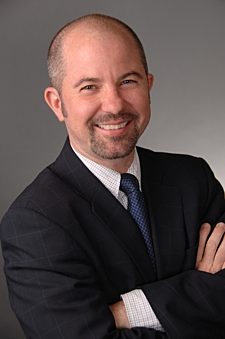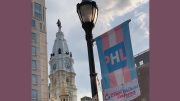
Shannon Minter, legal director for the San Francisco-based National Center for Lesbian Rights
Photo: NCLR
By: Chuck Colbert/TRT Reporter—
BOSTON, Mass.—A growing number of national and statewide LGBT organizations are coming out against the proposed Employment Non-Discrimination Act, saying that while it bans workplace discrimination on the basis of sexual orientation and gender identity, the federal law also would allow religious organizations to discriminate against LGBT people even in non-ministerial or pastoral capacities.
Advocates for LGBT equality maintain the proposed religious exemption, unprecedented in civil rights legislation, would in effect gut the non-discrimination protections.
Shannon Minter, legal director for the San Francisco-based National Center for Lesbian Rights, said in an email that NCLR now “strongly oppose[s] any religious exemption in ENDA or any other federal, state, or local non-discrimination law that is broader than the religious exemption that already exists in federal civil rights laws.”
“We do not support legislation that will create a new and broader exemption for LGBT people than exists for other protected groups,” Minter said. “While we are confident the current discriminatory religious exemption in ENDA will not be part of the final legislation, we will not continue to support ENDA if it is not changed to be consistent with Title VII’s religious exemption.” [pullquote]“While we are confident the current discriminatory religious exemption in ENDA will not be part of the final legislation, we will not continue to support ENDA if it is not changed to be consistent with Title VII’s religious exemption.”[/pullquote]
The 1964 CIVIL RIGHTS ACT Title VII in fact contains an exemption that addresses a narrow issue, specifically the interest of a religiously affiliated organization to create a community of fellow believers. Accordingly, the exemption allows faith-based organizations to hire employees based on their religion in order for the entity to maintain a religious community and faith based-identity. Title VII does not restrict protections in the law against workplace discrimination based on race, sex, or national origin.
Minter said that if ENDA were enacted in its current form, it would be “the first time in any civil rights legislation at any level, to my knowledge, expressly permitt[ing] discrimination on any other basis other than religion.”
He added, “There is a long history now of accommodating religious beliefs by permitting certain narrowly defined religious employers to favor individuals from the same faith.”
“That Title VII exemption,” Minter explained, “is reasonable” as “religious liberty is important. That kind of accommodation, we have decided for a long time now, makes sense.”
“But never, ever,” he added, “has a civil rights law—certainly not at the federal level or state level—said in addition to that, you can also discriminate on the basis of other protected categories, such as race, gender, disability, sexual orientation, or gender identity.”
Minter said that “sanctioning that type of discrimination is antithetical to the whole purpose of an anti-discrimination statute.”
“And to set the precedent that there is somehow something special or different about anti-discrimination laws for LGBT people that warrant that kind of unprecedented and unprincipled exemption would open a door that we do not want to open. I think it is very dangerous,” he said.
In a similar vein, Mark Snyder, a senior communications manager for the Oakland-based TRANSGENDER LAW CENTER (TLC), said that his organization is now “unable to support ENDA in its current form.” [pullquote]In a similar vein, Mark Snyder, a senior communications manager for the Oakland-based Transgender Law Center (TLC), said that his organization is now “unable to support ENDA in its current form.”[/pullquote]
At the same time, he added, “We are fully committed to continuing to work for the passage of a law like ENDA that contains an exemption for religious organizations that is no broader than the exemption in Title VII.”
In his recent comments, Snyder reiterated TLC’s “grave concerns” about the religious exemptions that were voiced last spring in a joint statement, along with NCLR, the American Civil Liberties Union (ACLU), and Lambda Legal Defense and Education Fund. That statement spelled out the implications of a faith-based exemption in the proposed legislation: It could provide religiously affiliated organizations—far beyond houses of worship—with a blank check to engage in employment discrimination against LGBT people.
“Some courts have said that even hospitals and universities may be able to claim the exemption; thus, it is possible that a religiously affiliated hospital could fire a transgender doctor or a religiously affiliated university could terminate a gay groundskeeper,” TLC’s statement said.
In addition to NCLR and TLC’s opposition to ENDA, GETEQUAL and QUEER NATION no longer support its current version. For its part, New York City-based Queer Nation has called for a comprehensive civil rights law that would ban discrimination in employment, housing, public accommodations, education, and federally-funded programs. [pullquote]“Some courts have said that even hospitals and universities may be able to claim the exemption; thus, it is possible that a religiously affiliated hospital could fire a transgender doctor or a religiously affiliated university could terminate a gay groundskeeper,” TLC’s statement said.[/pullquote]
The HUMAN RIGHTS CAMPAIGN, LAMBDA Legal, ACLU, and the NATIONAL CENTER FOR TRANSGENDER EQUALITY all support the current measure but remain concerned about any religious exemption carve-out provisions.
Moreover, recent legislative attempts at the state level in Arizona, Idaho, Kansas, Oregon, Tennessee, and South Dakota by social conservatives and the far right that would enable persons to discriminate against LGBT people and same-sex couples based on religious beliefs opposed to homosexuality have only raised the level of concern.
On the matter of social conservatives’ efforts to empower discrimination against LGBT people, Jay Michaelson, Ph.D. offered his assessment.
“Religious conservatives have really succeeded at ‘moving the goalposts’ here,” Michaelson said. “Just two years ago, this kind of broad exemption was a huge compromise for the Obama administration, in the context of the Affordable Care Act. Now, ENDA’s backers are offering it up as the default position. That is a huge, silent victory. And we all know what the ultimate goal is: Religious exemptions for anyone who wants one, including corporations and individuals. That would represent a tragic erosion of the rule of law.” [pullquote]“Religious conservatives have really succeeded at ‘moving the goalposts’ here,” Michaelson said. “Just two years ago, this kind of broad exemption was a huge compromise for the Obama administration, in the context of the Affordable Care Act. —Jay Michaelson, Ph.D.[/pullquote]
A visiting scholar at Brown University, Michaelson authored the 2013 report, “Redefining Religious Liberty: The Hidden Assault on Civil Rights.” He said that it’s “gratifying” that some organizations are saying that ENDA in its current form is “too high a price to pay.”
“Employment non-discrimination is vitally important, but at what cost?” Michaelson said. “Hopefully, progressive members of Congress will insist on an appropriate, narrow exemption for churches and religious functionaries, while rejecting this over-broad one that would leave hospital orderlies, school cafeteria workers, and shopping mall security guards without protection.”
Several statewide LGBT groups are also voicing their own growing uneasiness, including EQUALITY CALIFORNIA (EQCA), which said in a June 9 statement that it “supports passage of” ENDA, “but strongly oppos[es] the broad religious exemption attached to it.”
“Ensuring that all American employees are judged on the quality of their work, not their sexual orientation or gender identity, is fundamental to achieving full equality,” said Rick Zbur, EQCA executive director-elect. “But that protection shouldn’t come with an asterisk or loophole, and that’s what this religious exemption is—a way to promise full protection without delivering it. This exemption undermines the value of ENDA and it must be fixed.”
In voicing concerns, EQCA, which rarely weighs in on federal legislation, also pointed to California’s anti-discrimination protections “that don’t include this broad religious exemption.”
“These protections have been proven fair and effective in the nine years since they were enacted,” EQCA’s statement said.
In the Midwest, another statewide LGBT group, Equality Illinois, also issued a statement on ENDA, insisting the religious exemption provision be removed from “any bill that moves forward in either chamber.”
Like its California counterpart, Equality Illinois said it supports ENDA because of its overarching aim to “prohibit workplace discrimination against LGBT Americans” but opposes “including any exemptions that would give LGBT people less protection than other protected groups already under civil rights law,” according to the statement. [pullquote]Like its California counterpart, Equality Illinois said it supports ENDA because of its overarching aim to “prohibit workplace discrimination against LGBT Americans” but opposes “including any exemptions that would give LGBT people less protection than other protected groups already under civil rights law.”[/pullquote]
And like EQCA, Equality Illinois points to its state’s 2005 HUMAN RIGHTS ACT, which “has worked effectively to protect LGBT employees on the same terms as other groups.”
Bernard Cherkasov, executive director for Equality Illinois, said it is not out of the ordinary for statewide LGBT groups to speak out on federal issues.
“We have a great relationship with members of our congressional delegation, with senators and a good number of our U.S. representatives, who are champions of LGBT equality,” Cherkasov said. “It was so important for us, from a state that fought for transgender inclusion in our own state version of ENDA, without those overly broad religious exemptions, with our partners and supporters, to say it is possible to pass state employment non-discrimination without religious exemptions and without selling out and getting those overly broad religious exemptions that are unprecedented in federal civil-rights legislation.”
Since EQUALITY ILLINOIS spoke out—the first statewide gay group to do so—any number of statewide LGBT groups have followed suit, including Equality Michigan.
“Equality Michigan supports the passage of ENDA because our role as advocates is to stop harm, and in Michigan a report from our own Civil Rights Department showed that discrimination against LGBT people in our state is pervasive,” said Emily Dievendorf, executive director.
However, she added “Equality Michigan does not support the religious exemptions and holds onto enough concerns around the exemptions that we reserve the right to withdraw support for ENDA should the exemptions prove likely to endanger its ability to provide the intended protections and or to do no harm—two criteria any quality policy must meet the first time around.”
On the East Coast, the statewide LGBT group MASSEQUALITY, for example, as well as Gay and Lesbian Advocates and Defenders, a legal advocacy organization, said that while they still support ENDA, the religious exemption provision should be removed.
“Support for marriage equality is at an all time high and increasing, and yet many LGBTQ people across America still experience alarming rates of discrimination at work, at school, in housing and in public accommodations simply because of who they are,” said Kara S. Coredini, MassEquality executive director. “ENDA is about ensuring fairness and equality, both of which are undermined by [a religious] exemption that would result in second-class protections for LGBTQ people.” [pullquote]“ENDA is about ensuring fairness and equality, both of which are undermined by [a religious] exemption that would result in second-class protections for LGBTQ people.”—Kara S. Coredini, MassEquality executive director[/pullquote]
Voicing agreement with Cherkasov, she added, “State-based LGBTQ groups have an essential and effective role to play on federal matters. After all, every federal issue is ultimately experienced in the state communities we call home.”
For its part, “GLAD still supports ENDA in this Congress while we strongly oppose its religious exemption and hope it will be changed,” said spokeswoman Carisa Cunningham, the organization’s director of public affairs and education.
ENDA passed the U.S. Senate November 7 by a 64-32 vote, marking the first time that legislative body approved federal civil rights legislation banning anti-LGBT employment bias. In 1996, the Senate failed to pass ENDA by vote of 49-50.
Still, other stumbling blocks remain. For instance, the current version of ENDA contains a provision that would ban state and local governments from “retaliating against religious groups that take action only permissible because of [ENDA’s] religious exemption clause,” and House Speaker John Boehner (R-Ohio) has said over and over that he would not bring ENDA to a vote, claiming the legislation is unnecessary and would lead to frivolous litigation. [pullquote]The U.S. Conference of Catholic Bishops opposes ENDA in its entirety, with San Francisco Archbishop Salvatore J. Cordileone penning a letter to a Senate committee explaining the Catholic Church’s reasoning against the measure.[/pullquote]
The U.S.CONFERENCE OF CATHOLIC BISHOPS opposes ENDA in its entirety, with San Francisco Archbishop Salvatore J. Cordileone penning a letter to a Senate committee explaining the Catholic Church’s reasoning against the measure.
The pro-LGBT Catholic group Equally Blessed, which includes Dignity/USA, New Ways Ministry, and Chicago-based Call to Action, among others, wrote (September 16, 2013) to senators in support of ENDA, but at the same time, the coalition raised concerns about any religious exemptions.
“We urge you to remove…the religious exemption from the current draft of the bill. Our nation’s religious institutions have nothing to fear from legislation that treats every citizen as though they were equal in the eyes of God,” the letter read.
Copyright ©2014 Chuck Colbert. All Rights Reserved.







